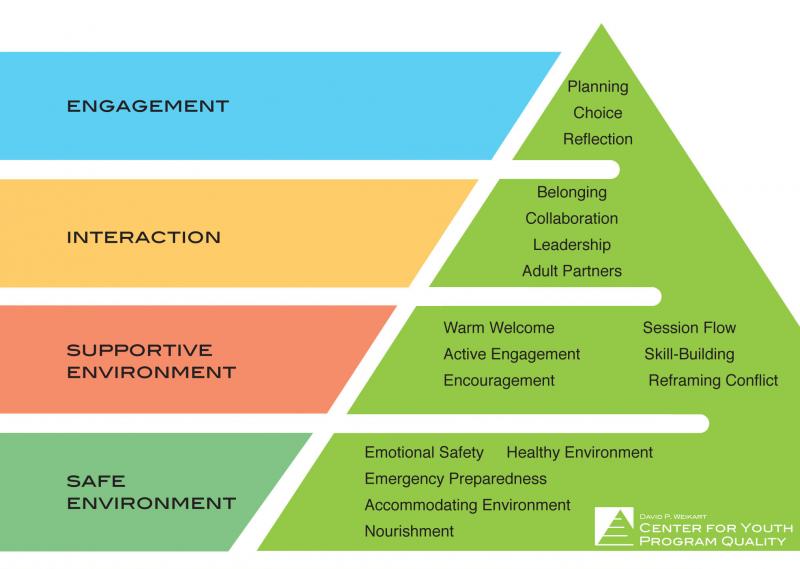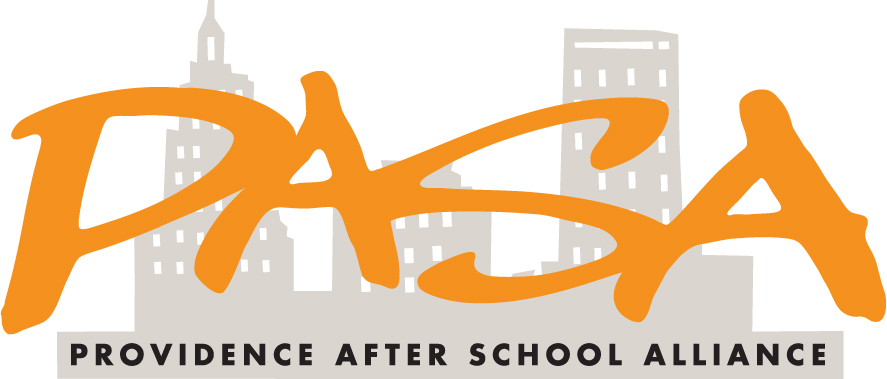by Brittany Sandbergen, Coordinator of Professional Development and Training
posted 5.29.14
AfterZone Site Coordinator Luke Martin leads a lesson in making Glurch for AfterZone Educators and Program Support Staff
For the last three months I’ve been working with an incredible group of educators—both teachers and informal STEM educators from local organizations throughout Providence—who have come together to for collaborative professional development for our STEM-focused AfterZone Summer Scholars program.
We already know that social-emotional competencies and academic learning are inextricably linked, but this was the first time we’d designed our summer professional development so that STEM and positive youth development trainings were completely integrated.
To do this, we took the positive youth development pyramid as our PD jumping off point, making sure our trainings mirrored the pyramid itself. In keeping with that, we started back in March by simply getting to know one another—the first step to building the base of the pyramid.

The series is designed to be cumulative, so when we established a “safe environment” for each other, we moved into Camp Culture trainings, which involve activities that require feeling supported and comfortable with our peers. Like “Minute to Win It.”
Gilbert Stuart AfterZone Educator Angela Murcia gets real about Knock ‘Em Downers
From there, it was on to learning about higher level functions like inquiry, facilitated learning, discussion-based learning, and questioning of one another—learning how to teach without direct instruction. These trainings help educators learn how to guide their youth through the process of inquiry, no giving of answers allowed.
It’s an extremely difficult practice to learn, but my group was eager and handled themselves with the enthusiasm and focus of dedicated hands-on learners!
Dirt Don’t Hurt! School Day Educator Rayna aRusso and Instructional Specialist Anthony Pacitto
learn by asking questions about a mason jar of soil
With the bulk of the pyramid in tact, we moved into Guided STEM, which serves as the entry way into the skills we want our youth to walk away with—critical thinking, problem solving, and youth-driven learning experiences. Because these are higher level skills, they are extremely difficult to accomplish without the foundation of positive youth development. These skills require students to feel safe, supported, and empowered in their learning process because development of these skills requires that both youth and adults trust the process and feel that they can take risks and be wrong as part of the learning process.
I was particularly moved when my team of educators participated in an ice breaker activity for the Guided STEM training where we all stood in a circle (I call it a “family circle”) and touched one another’s hands. We would have never done this as a first introduction to one another. That activity, simple though it sounds, involves a lot of trust and comfort that needs to be developed over time.
Key to PASA’s professional development strategy is having adult educators experience the activities from the students’ point of view. By having educators also play the role of the student, they’re able to see where their instruction might need improvement, what possible points of frustration might arise from the students’ perspective, and therefore improves instruction.
Left to Right: School Day Educator Rayna aRusso, Davis Park Community Educator Nina Wang, AfterZone Educator Cindy Castellone, and School Day Educator Kelsey Heim debate how to represent a data set visually with M&Ms
For all of the trainings, we provided them with the resources and materials to implement in their curricula as they see fit. Apparently, if you incorporate M&Ms into a data representation activity, adults and kids think that any frustration pays off big time.
We only have three summer professional development trainings left, and I couldn’t be more excited about the progress I’ve seen over the last months. It’s amazing to watch some of Providence’s best teachers having so much fun doing hands-on learning themselves. One teacher has already taken the “Minute to Win It” challenges back to her classroom, and another called me over the weekend to find out where I got supplies for the “Dirt Don’t Hurt” activity so that she could use it this week.
I’d say hands-on learning works great for youth and grown-ups alike!
Want to see more pictures of Providence educators getting hands-on and having fun? Check out our Facebook page.
